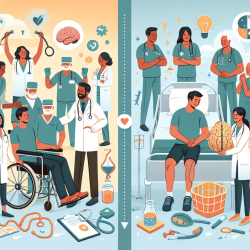Introduction
Adverse Childhood Experiences (ACEs) are a significant factor in the development of chronic health conditions, including chronic pain and rheumatic diseases in children. The recent study titled "Exploring the intersection of adverse childhood experiences, pediatric chronic pain, and rheumatic disease" sheds light on the profound impact ACEs have on pediatric health outcomes. This blog post aims to help practitioners understand these findings and consider their implications for improving patient care.
The Study at a Glance
The research conducted by Sonagra et al. (2022) involved a cross-sectional cohort study of 412 pediatric patients with chronic pain. The study found that over 75% of these patients reported at least one ACE, with the most common being a history of mental illness in a first-degree relative and parental divorce or separation. The presence of multiple ACEs was associated with increased somatic symptoms, worse functional disability, and a higher prevalence of mental health conditions.
Key Findings and Implications
- Prevalence of ACEs: The study highlights that a significant number of children with chronic pain have experienced ACEs, emphasizing the need for routine screening in clinical settings.
- Functional Disability: Children with two or more ACEs exhibited greater functional disability, indicating that ACEs exacerbate the impact of chronic pain and rheumatic diseases.
- Mental Health Correlations: There was a notable correlation between ACEs and mental health conditions such as anxiety, depression, and suicidal ideation, suggesting that comprehensive care should include mental health support.
- Biopsychosocial Model: The study supports the biopsychosocial model, which integrates biological, psychological, and social factors in understanding and treating chronic pain.
Recommendations for Practitioners
Practitioners are encouraged to incorporate the following strategies into their practice:
- Routine Screening for ACEs: Implement systematic screening for ACEs in children presenting with chronic pain to identify those at higher risk for severe outcomes.
- Trauma-Informed Care: Adopt a trauma-informed approach that considers the child's past experiences and integrates psychological support into treatment plans.
- Interdisciplinary Collaboration: Work collaboratively with mental health professionals to address the psychological aspects of chronic pain and improve overall patient outcomes.
- Family and Social Support: Encourage family involvement and support systems to mitigate the effects of ACEs and promote resilience in children.
Conclusion
The intersection of ACEs, chronic pain, and rheumatic disease presents a complex challenge for pediatric healthcare providers. By understanding and addressing the impact of ACEs, practitioners can improve the quality of care and outcomes for affected children. For those interested in delving deeper into the research, the original study offers valuable insights into the mechanisms and implications of ACEs on pediatric health.
To read the original research paper, please follow this link: Exploring the intersection of adverse childhood experiences, pediatric chronic pain, and rheumatic disease.










